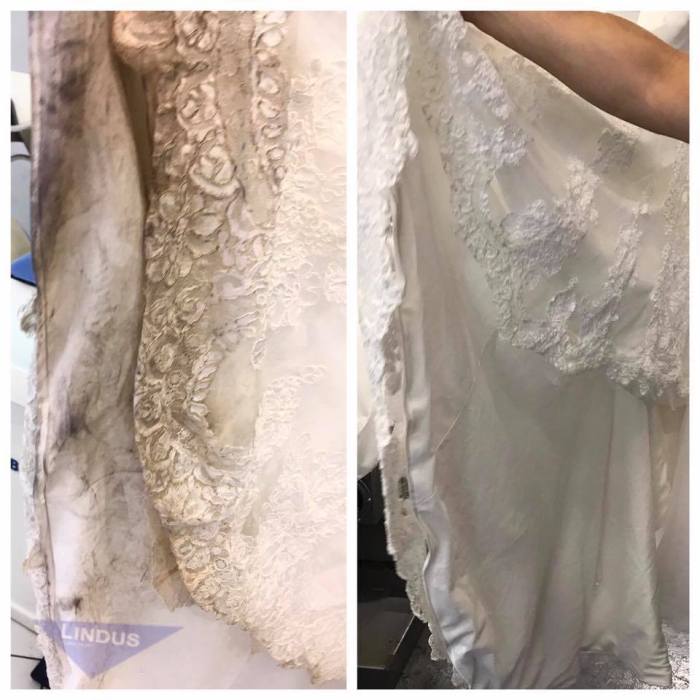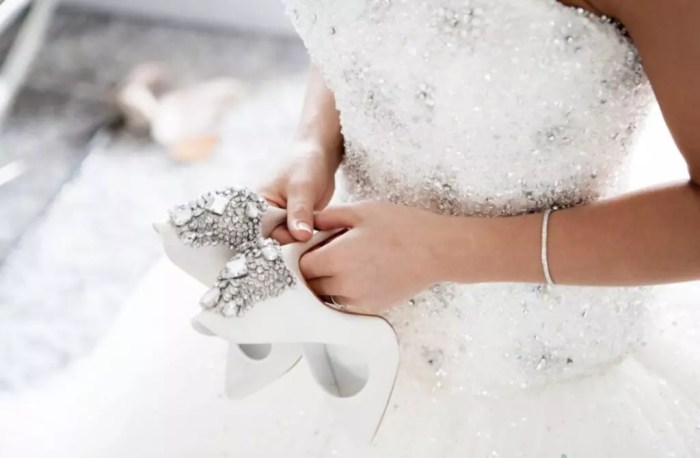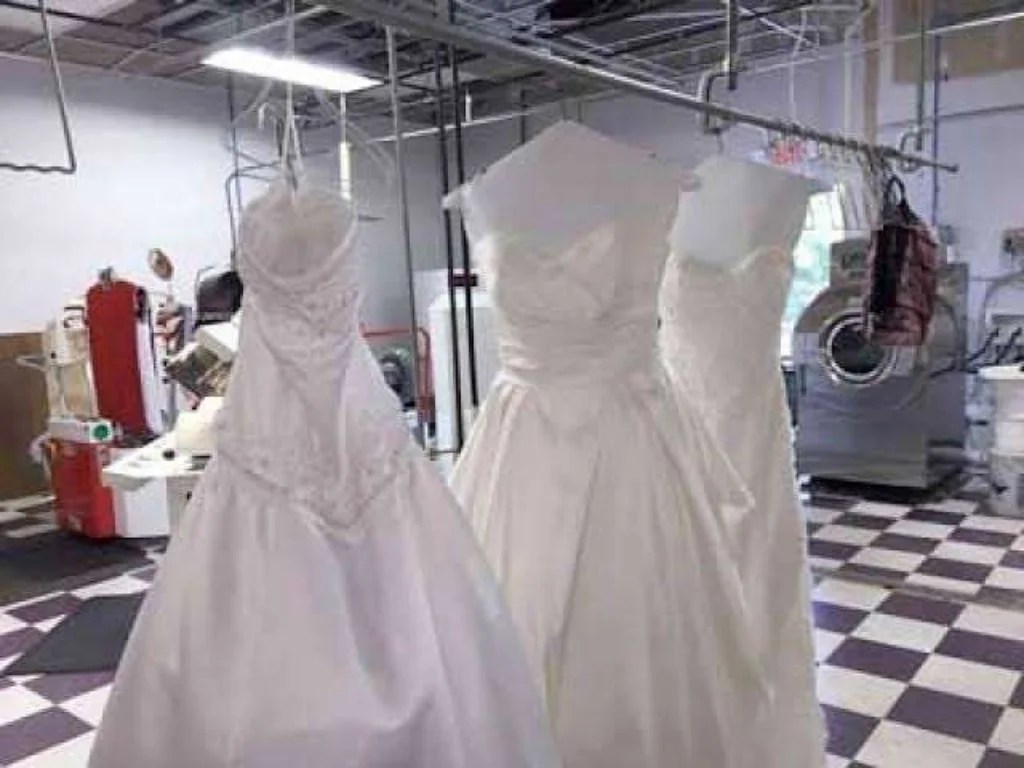Finding Reputable Dry Cleaners
Dry cleaners that clean wedding dresses – Choosing the right dry cleaner for your precious wedding dress is crucial. A reputable cleaner possesses specific qualities that set them apart, ensuring your gown’s preservation and longevity. This section will guide you through identifying these key characteristics and understanding the services offered by specialized versus general dry cleaners.
Key Characteristics of Reputable Wedding Dress Cleaners
Three key characteristics distinguish a reputable wedding dress cleaner: specialized expertise, comprehensive insurance, and transparent guarantees. A dedicated wedding dress cleaner possesses in-depth knowledge of various fabrics, embellishments, and cleaning techniques. Comprehensive insurance protects your investment in case of unforeseen damage, while transparent guarantees provide peace of mind regarding the outcome of the cleaning process.
Specialized vs. General Dry Cleaners: A Service Comparison
Specialized wedding dress cleaners offer a vastly different service compared to general dry cleaners. Specialized cleaners use gentle, preservation-focused methods tailored to delicate fabrics and intricate embellishments. General dry cleaners, while capable of cleaning some garments, may lack the expertise and specialized equipment to handle the unique needs of a wedding dress, potentially leading to damage.
The Importance of Insurance and Guarantees
Insurance and guarantees are paramount when entrusting your wedding dress to a dry cleaner. Insurance covers potential losses or damages during the cleaning process, safeguarding your investment. A strong guarantee demonstrates the cleaner’s confidence in their abilities and commitment to customer satisfaction. Look for cleaners offering comprehensive insurance and clear, detailed guarantees.
Dry Cleaning Pricing Comparison
| Cleaner Name | Cleaning Method | Price | Guarantee |
|---|---|---|---|
| Elegant Bridal Cleaners | Wet Cleaning | $300 | 1-year guarantee against damage |
| Preservation Plus | Dry Cleaning | $250 | 6-month guarantee against stains |
| ABC Dry Cleaners | Spot Cleaning | $150 | No specific guarantee |
| The Wedding Gown Specialist | Wet Cleaning & Pressing | $350 | Lifetime guarantee against yellowing |
Wedding Dress Cleaning Methods
Several cleaning methods exist, each with its own advantages and disadvantages depending on the fabric and embellishments. Understanding these methods is vital in making an informed decision.
Different Wedding Dress Cleaning Methods
Three primary methods are commonly employed: wet cleaning, dry cleaning, and spot cleaning. Wet cleaning involves using water and specialized detergents to clean the gown, ideal for removing certain stains. Dry cleaning uses solvents to clean the garment, suitable for delicate fabrics that might shrink or damage with water. Spot cleaning focuses on treating specific stains or soiled areas.
Advantages and Disadvantages of Each Method
Wet cleaning is effective for removing various stains but may not be suitable for all fabrics, potentially causing shrinkage or damage. Dry cleaning is gentle on delicate fabrics but might not remove all stains effectively. Spot cleaning is ideal for localized stains but may not address overall dirtiness. The choice depends on the fabric composition and the extent of soiling.
Pre-Cleaning Inspection Process
A thorough pre-cleaning inspection is crucial. The cleaner should meticulously examine the dress, noting any stains, tears, loose embellishments, or other damage. This detailed assessment allows for a customized cleaning plan that minimizes risk and maximizes preservation.
- Visual inspection of the entire dress
- Detailed examination of fabric type and condition
- Assessment of embellishments for potential damage
- Identification and documentation of stains and damages
- Discussion with the client regarding cleaning options and potential risks
Packaging and Handling of Wedding Dresses
Proper packaging and handling are essential to prevent damage before and after cleaning. The dress should be carefully packaged to protect it during transit and storage.
- Use a breathable garment bag made of acid-free material.
- Avoid using plastic bags, which can trap moisture and cause yellowing.
- Handle the dress gently, avoiding harsh pulling or tugging.
- Fold the dress carefully, if necessary, along seams to minimize creasing.
- Store the dress in a cool, dry, and dark place.
Fabric Considerations and Potential Damage
Wedding dress fabrics vary widely, each requiring specific cleaning considerations. Understanding these differences is vital in preventing damage during the cleaning process.
Common Wedding Dress Fabrics and Cleaning Requirements, Dry cleaners that clean wedding dresses
Silk, satin, lace, tulle, and organza are common wedding dress fabrics. Silk and satin are delicate and require gentle cleaning methods. Lace and tulle are prone to snagging, requiring careful handling. Organza can be delicate and prone to wrinkling.
Embellishments and Their Impact on Cleaning
Beads, sequins, and other embellishments add beauty but complicate cleaning. These embellishments can be delicate and prone to damage during cleaning. Specialized techniques are often required to prevent loss or damage to these embellishments.
Common Types of Damage During Cleaning
Color bleeding, shrinking, fabric damage, and damage to embellishments are common risks during the cleaning process. These can be minimized with proper cleaning techniques and careful handling.
Fabric Types, Cleaning Methods, and Potential Risks

Source: com.au
| Fabric Type | Recommended Method | Potential Risks | Precautions |
|---|---|---|---|
| Silk | Wet Cleaning (with specialized detergent) | Shrinkage, color bleeding | Pre-test cleaning solution on an inconspicuous area |
| Satin | Dry Cleaning | Water stains, wrinkling | Handle gently, avoid harsh pressing |
| Lace | Spot Cleaning | Snagging, tearing | Avoid harsh scrubbing |
| Tulle | Dry Cleaning | Snagging, yellowing | Avoid harsh chemicals |
Customer Experience and Reviews: Dry Cleaners That Clean Wedding Dresses
Thorough research and evaluation of customer reviews are crucial for selecting a reputable dry cleaner. This section highlights key aspects of a positive customer experience and provides guidance on evaluating potential cleaners.
Researching and Evaluating Customer Reviews
Check online reviews on platforms like Yelp, Google Reviews, and WeddingWire. Look for consistent positive feedback regarding the cleaner’s expertise, communication, and attention to detail. Pay attention to reviews mentioning specific experiences with wedding dress cleaning.
Key Elements of a Positive Customer Experience

Source: officialroyalwedding2011.org
A positive customer experience includes clear communication, prompt service, a thorough pre-cleaning inspection, and careful handling of the dress. The cleaner should also provide updates throughout the cleaning process and address any concerns promptly.
Questions to Ask a Potential Dry Cleaner
Before submitting your dress, ask about their experience with wedding dress cleaning, their cleaning methods, insurance coverage, guarantees, and turnaround time. Inquire about their process for handling delicate fabrics and embellishments.
Red Flags Indicating an Unreliable Dry Cleaner
Lack of insurance, vague or nonexistent guarantees, negative online reviews, unwillingness to answer questions thoroughly, and unusually low prices are red flags. Trust your instincts—if something feels off, choose another cleaner.
- Negative or inconsistent online reviews
- Lack of specialized experience with wedding gowns
- Absence of insurance or guarantees
- Unprofessional or unresponsive communication
- Unusually low prices compared to competitors
Post-Cleaning Care and Storage
Proper post-cleaning care and storage are essential for preserving your wedding dress’s condition. This section provides guidance on these crucial steps.
Importance of Post-Cleaning Care
Post-cleaning care, often including pressing and proper packaging, ensures the dress remains in pristine condition. This step helps to remove any lingering wrinkles and protects the dress from future damage.
Methods for Storing a Cleaned Wedding Dress

Source: slidesharecdn.com
Store the dress in a cool, dark, and dry place in a breathable, acid-free garment bag. Avoid storing it in plastic bags, attics, or basements. Keep it away from direct sunlight and moisture.
Identifying and Addressing Potential Issues
Regularly inspect the dress for any signs of damage, such as yellowing, discoloration, or tears. Address any issues promptly to prevent further damage.
Ideal Storage Conditions for a Wedding Dress
Imagine a climate-controlled closet or storage unit. The space is dark, dry, and cool, free from direct sunlight, moisture, and pests. The wedding dress is carefully stored in a breathable, acid-free garment bag, suspended on a padded hanger to prevent creasing. The environment is consistently maintained at a moderate temperature and humidity to prevent damage. The storage area is clean and free from dust or other debris.
FAQs
What should I do if I notice damage after the dress is cleaned?
Immediately contact the dry cleaner and document the damage with photos. Most reputable cleaners will have a process for addressing such issues.
How long does the cleaning process typically take?
Cleaning times vary depending on the cleaner and the complexity of the dress, but it can range from a few days to several weeks.
Finding a reputable dry cleaner specializing in wedding dress preservation is crucial; the delicate fabrics require expert care. Consider the iconic elegance of a wedding dress, such as when viewing audrey hepburn in a wedding dress , and you’ll understand the need for meticulous cleaning. Therefore, selecting a dry cleaner with experience handling such precious garments ensures your dress remains in pristine condition for years to come.
Can I clean my wedding dress myself?
It’s generally not recommended to attempt cleaning a wedding dress yourself, unless it’s a very simple, unadorned dress and you have extensive experience with delicate fabrics. Professional cleaning is always the safest option.
What is the difference between wet cleaning and dry cleaning for wedding dresses?
Wet cleaning uses water and specialized detergents, suitable for many fabrics, while dry cleaning uses solvents and is better for delicate or embellished dresses. The best method depends on the fabric and embellishments.
